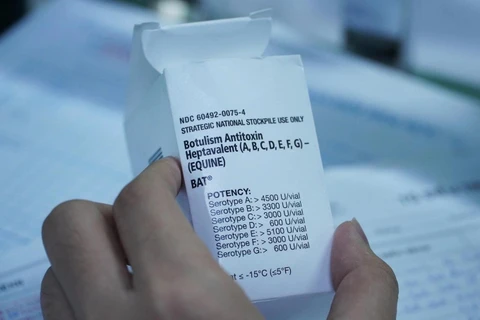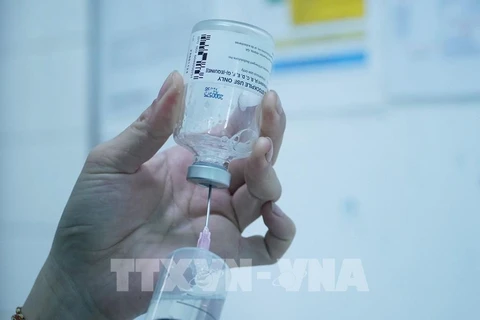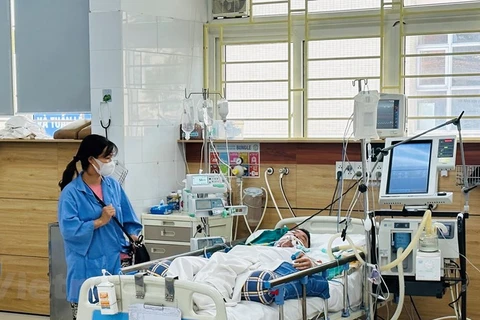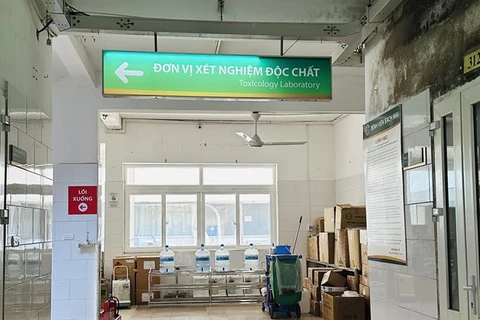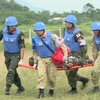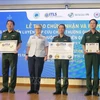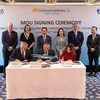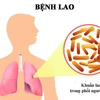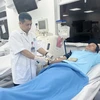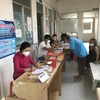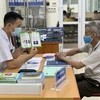 A chemical poisoning patient is treated at the detoxification centre at the Bach Mai Hospital in Hanoi. (Photo: VietnamPlus)
A chemical poisoning patient is treated at the detoxification centre at the Bach Mai Hospital in Hanoi. (Photo: VietnamPlus) Hanoi (VNA) – Currently, the incidents of food poisoning, chemical poisoning, and drug abuse are on the rise. Vietnam urgently needs a long-term strategy to stockpile rare medicines for treatment.
As regulated, every year, hospitals must compile a list of rare drugs that need to be imported and submit it to competent health agencies for approval and purchase. However, the problem of rare drug shortage emerges on an annual basis.
According to a report from the Ministry of Health, in April alone, there were eight cases of food poisoning nationwide, with 117 people poisoned, including one fatality. In the first four months, a total of 25 cases were logged, with 344 people poisoned, including eight fatalities.
Medical experts believe that the causes of food poisoning can be found at every stage, from the selection of ingredients, preparation, processing, to preservation, and sales.
According to Dr. Nguyen Trung Nguyen, the head of the detoxification centre at the Bach Mai Hospital in Hanoi, in the work of poisoning prevention, if people can control the circulation and distribution of toxic chemicals, and even halt the circulation of the substances in severe cases, then risks can be avoided.
The issue of rare drugs and antidotes has been a long-standing problem, he said. These kinds of drugs, even if individual hospitals or ministries wish to purchase them, can't be obtained without special mechanisms.
The unpredictable nature of emergencies, poisoning cases, injuries, and epidemics makes it challenging to plan for drug reserves. Therefore, functional agencies should divide the task into two parts: building a rare drugs reserve and a national strategic reserve.
Regarding the shortage of rare drugs, Pham Khanh Phong Lan, head of the Ho Chi Minh City steering board for food safety management, candidly stated that in reality, Vietnam, for many years, has faced a shortage of basic antidotes and rare drugs. Due to the infrequency of poisoning cases and unstable demands, there are few research, manufacturing, and distribution companies getting involved in the field.
 Medical staff prepares treatment drugs for patients at the detoxification centre at the Bach Mai Hospital in Hanoi. (Photo: VietnamPlus)
Medical staff prepares treatment drugs for patients at the detoxification centre at the Bach Mai Hospital in Hanoi. (Photo: VietnamPlus) Lan emphasised that the Ministry of Health should act as the lead agency, deciding the list, demand, quantity for nationwide preventive planning, and the reserve of specific drugs that can be stored in Hanoi and Ho Chi Minh City for prompt distribution when needed.
Therefore, according to the official, a national reserve must exist.
Elaborating on the issue of stocking rare drugs, Deputy Director of the Ministry of Health’s Drug Administration of Vietnam (DAV) Le Viet Dung noted in accordance with the Prime Minister's directive, the ministry is quickly implementing the establishment of between three and six centres for storing rare drugs and limited-supply drugs nationwide. The number of drugs in the reserve list is about 15-20 types.
 Medical staff takes care of a patient of severe poisoning at the Bach Mai Hospital in Hanoi. (Photo: VietnamPlus)
Medical staff takes care of a patient of severe poisoning at the Bach Mai Hospital in Hanoi. (Photo: VietnamPlus) The DAV is also in talks with the World Health Organisation (WHO) to study the WHO's storage mechanism and a way to link the storage of rare drugs and drugs with limited supply in Vietnam with those of other countries in the region, as well as with WHO's storage facilities.
Currently, the legal basis for rare drugs is sufficient, so the DAV has issued documents requesting healthcare facilities nationwide to proactively build their lists of needed drugs. They also asked for forecast disease situations, estimated drug quantity, and purchase requests to ensure adequate treatment supplies./.

